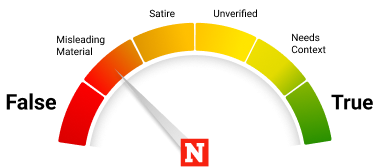The growth of Big Tech has steadied recently with well-publicised reports of lay-offs and restructuring at firms like Meta, Netlfix and Tesla to name just a few.
Despite notions that Silicon Valley is another bubble about to burst, metaverses—a type of digital space where people can socialize, collaborate on work projects and play games—have been gathering momentum.
Facebook creator and Meta CEO Mark Zuckerberg is among its loudest proponents, investing billions and heralding it as the successor to the mobile internet.
However, the online public's response to Zuckerberg's enthusiasm has been somewhat lacklustre, if recent claims on social media are to be believed.

The Claim
A number of tweets, posted in October 2022, suggested or implied that Mark Zuckerberg's metaverse project has been a failure, costing $1.2 billion and only gaining 30 daily users.
One tweet states "Good job with the Metaverse Zuck."
The posts refer to an article by The Byte with the headline "$1.2 BILLION METAVERSE HORRIFIED BY REPORT IT ONLY HAD 38 ACTIVE USERS."
While the tweets mention only 30 users, this was based on earlier version of the The Byte's article.
The Facts
Zuckerberg has wholeheartedly embraced the concept and technology of the metaverse, rebranding his social media empire to Meta along with the launch of its own "digital space," Horizon Worlds.
Horizon Worlds is not the only metaverse, however, with other types being built upon blockchain technology.
For those unfamiliar with the concept, a blockchain is a form of technology that records information across a large number of computers, grouping data in sequential blocks.
Blockchain technology was the foundation on which Bitcoin and many cryptocurrencies were built, and it is now also being utilized in metaverse development.
Although metaverses have become a hot topic in tech and business circles, the technology is still facing headwinds in terms of expanding the userbase.
This is perhaps why the term "metaverse" has become confusingly synonymous with Zuckerberg, evident by these recent claims shared on social media.
The $1.2 billion project referred to in the social media posts and the article by The Byte, though perhaps misleadingly absent from the headline, is in fact Decentraland, built on the Ethereum blockchain platform (among the most widely-used blockchains in the world), unconnected to Zuckerberg or Meta.
Horizon Worlds, unlike Decentraland, is not built on a blockchain and moreover, Meta has allegedly spent significantly more on Horizon Worlds, around $15 billion, according to reports.
Furthermore, Meta claims Horizon Worlds has a user base of 300,000, although other estimates suggests it may be closer to 32,000.
It's worth noting too that Decentraland has also disputed the claims about its user base, claiming it to be closer to 8,000, though Newsweek could not immediately verify that number.
Crucially though, it appears the claims on social media have confused Decentraland with Zuckerberg and Meta, perhaps in part due to the imprecise wording of the article headline.
Newsweek has contacted Meta and Decentraland for comment.
The Ruling

Misleading Material.
The "metaverse" referred to in the claims on social media has nothing to do with Mark Zuckerberg or his company, Meta. It is related to another project built on the blockchain called Decentraland. Decentraland's developers have also disputed the user base figure quoted online.
FACT CHECK BY Newsweek's Fact Check team
Uncommon Knowledge
Newsweek is committed to challenging conventional wisdom and finding connections in the search for common ground.
Newsweek is committed to challenging conventional wisdom and finding connections in the search for common ground.
About the writer
To read how Newsweek uses AI as a newsroom tool, Click here.





